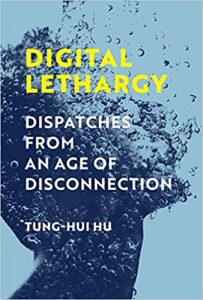In Digital Lethargy: Disparities from An Age of Disconnection, Tung-Hui Hu explores digital lethargy as the burnout, exhaustion and restlessness experienced under digital capitalism. Neo Yee Win recommends this thought-provoking and innovative book to anyone seeking different perspectives on how to view and navigate digital infrastructures.
Digital Lethargy: Disparities from An Age of Disconnection. Tung-Hui Hu. MIT Press. 2022.
 In the digital age, what does it mean to be human? And who gets to define humanness? In Digital Lethargy: Disparities from An Age of Disconnection, Tung-Hui Hu examines the human condition in the age of digitalisation. Not only are people expected to be constantly connected and productive, but they also harbour expectations of convenience and speed from technology-facilitated services, which are in turn supported by human-technology assemblages. The flurry of expectations and activity naturally leads to burnout, exhaustion and restlessness, which Hu calls ‘digital lethargy’. But the author is not pessimistic about the withdrawal. Rather, he argues that it is precisely the lull of digital lethargy that allows us to endure the crisis wrought by digital capitalism.
In the digital age, what does it mean to be human? And who gets to define humanness? In Digital Lethargy: Disparities from An Age of Disconnection, Tung-Hui Hu examines the human condition in the age of digitalisation. Not only are people expected to be constantly connected and productive, but they also harbour expectations of convenience and speed from technology-facilitated services, which are in turn supported by human-technology assemblages. The flurry of expectations and activity naturally leads to burnout, exhaustion and restlessness, which Hu calls ‘digital lethargy’. But the author is not pessimistic about the withdrawal. Rather, he argues that it is precisely the lull of digital lethargy that allows us to endure the crisis wrought by digital capitalism.
Possibly anticipating the difficulties of understanding digital lethargy through definitions alone, Hu offers day-to-day examples of how it may look and feel. For the everyday digital user, digital lethargy could manifest in how one passes time or expresses ambivalence, such as scrolling aimlessly through social media or responding with ‘lol’ when one is unsure of a proper response. The author also cites several artistic works to exemplify the phenomenon of digital lethargy. In Chapter Two, ‘Wait, Then Give Up’, he highlights the characteristics of banality and lack of audience interaction in artist Cory Arcangel’s 2011 films, Self Playing Nintendo 64 NBA Courtside 2 and Various Self Playing Bowling Games. Similarly in Chapter Six, ‘Do Nothing Together’, Hu discusses the significance and challenges of non-participation in taller de nada, artist nibia pastrana santiago’s workshop on doing nothing for 30 hours.
Through these examples, digital lethargy is described as a condition that resembles, but is not synonymous with, disappointment, disempowerment and disengagement. Hu takes extra care to distinguish digital lethargy from complete passivity. It is more akin to the in-between, the waiting, the impasse, the deadlock, the deferral — the moment before something happens, if at all. When the moment is left unresolved, it stretches out horizontally to become a condition to endure.

Image Credit: Photo by Luis Villasmil on Unsplash
Very often, endurance is thought of as a passive reaction to oppression. Whether in academia or activism, the digital underclass, such as microworkers and factory workers in the digital supply chain, has long been described as an exploited group without agency. Drawing upon a talk by anthropologist Mary L. Gray on her interviews with clickworkers, Hu argues that such characterisations erase the agency of workers by conflating endurance with passivity, when in fact these workers bring ambition and creativity to their jobs just like white-collar workers. Moreover, the digital labour outsourced to the Global South is increasingly complex, with workers’ inputs on, say, the identification of facial expressions, feeding directly into the development of deep learning and artificial intelligence technologies, which are then relied upon for algorithmic predictions. Without recognising the complexity of their labour, we risk treating these workers as mere robots at the service of tech companies.
That being said, the assumption that human beings are characterised by agency is a problematic one, as the converse implies that the passive are sub-humans or even non-humans. Hu critiques the privileged status bestowed onto ‘agency’ and, by association, ‘liveness’, as markers of humanness; the divide between humans and non-humans is not necessarily apparent in terms of vitality. In Heike Geissler’s Seasonal Associate, the role of an Amazon factory worker as both an employee and Amazon user shows how the recipient who gets to enjoy digital services can also be the very worker subjected to Amazon’s productivity markers. Similarly, society shuns vagrants for ‘doing nothing’, but allows tourists to ‘do nothing’ in the name of relaxing, effectively forgetting that human beings embody both agency and passivity, engagement and disengagement, and liveness and immobility. Drawing on moments of under-performance and non-participation, Hu uses digital lethargy to scrutinise these binaries and asks us to reconsider validating humanness in terms of agency, engagement and liveness.
In sum, Digital Lethargy is an important contribution to understanding the human-tech relationship. When we disengage from the flurry of digital activity, we need not feel guilt and shame. On the contrary, moments like these grant us space to contemplate the banal without having to expect a resolution. Digital lethargy reminds us of the complexity of being human and how that gets hidden through digital intermediaries and platforms that repackage human work as artificial labour. It reminds us that digital services do not work as intended because they fail to be inclusive of the many dimensions of what it means to be a legitimate human: people of colour are more likely to be misrecognised by facial recognition technologies, people must solve CAPTCHA puzzles to be worthy of using Google’s search engine. There is much, much more work that needs to be done to make digital innovation more inclusive. Hu suggests that the way to that is not by getting ahead as per the demands of digital capitalism, but by staying still and listening to your surroundings.
Despite Hu’s call, I can nevertheless see how other readers may be unconvinced of the potential of digital lethargy. As the author himself recognises, computational culture is traditionally ableist and white. When one falls beyond the normative categories of being human, one not only risks being marginalised in the digital world, but one’s very struggles with the digital are built upon layers of marginalisation in the pre-digital and non-digital worlds. Not all struggles can be endured. This is the reality for many whose identities are invalidated from multiple dimensions like race, gender, class, religion, disability, sexual orientation, etc. I fully agree with the value of staying still as I cannot dispute the fact that the future will come for us all anyway. The question is, what kind of future awaits? Perhaps then, we should ask questions of when: when do we seek resolutions, and when do we sit still and listen?
Digital Lethargy is a thought-provoking and innovative book on the relationship between humans and digital media, and I would highly recommend it to anyone seeking different perspectives on how one should view and navigate digital infrastructures. As this is Hu’s latest book, I myself intend to catch up with his previous works on digital media, starting with A Prehistory of the Cloud.
- This review first appeared at LSE Review of Books.
- Please read our comments policy before commenting.
- Note: This article gives the views of the author, and not the position of USAPP – American Politics and Policy, nor of the London School of Economics.
- Shortened URL for this post: https://bit.ly/3J2IHeR






